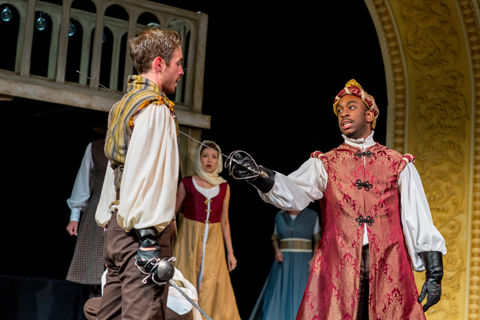
THRUST AND PARRY Romeo and Juliet’s supporting cast finding the heart of the play. |
Wherefore art we so enduringly enamored of Romeo and Juliet? Is it the vicarious thrill of love before we knew better, or the affirmation that we do, indeed, know better? Their romance is more impulsive than starry in a measured, traditional production at the Theater at Monmouth, directed by Dawn McAndrews: one wants less to be in the teenagers’ skin, quivering along with them, than to shout out advice, to tell them to just slow down and think things through a little, for God’s sake.
McAndrews doesn’t modernize or gussy up the lovers’ time and place; Romeo (Leighton Samuels) and Juliet (Lindsay Tornquist) live and swoon in period Verona, which is, in set designer Stacey Koloski’s rendering, spare, classical, and elegant: Juliet’s balcony extends in clean lines from stage right, and the space beneath and downstage of it is used for most all other settings. The folk of Verona wear quietly refined white sleeves and simple tunics in hues of wine, earth, and bronze.
Virginal Juliet wears white, of course, and in Lindsay Tornquist’s portrayal she is blonde, broad-smiling, graceful, and often rippling with laughter. She has the self-possession and empathetic gaze of the class president who is also genuinely nice, and there’s an appealing candor and artlessness to her speech. Her Romeo, in Samuels’ hands, has a winning grin and careening enthusiasm—he reels around stage like swift water over a rocky creek bed, occasionally even falling over himself in the process. The love of these two is sweet, giddy, and not particularly carnal. They are nice, normal kids, not particularly rebellious by nature; they look good together, and they convey an endearing buddy quality, though not an all-absorbing passion, in their wooing.
Their giggling, reeling, and lack of ceremony stand in contrast to the pomp and poise of the older nobles like Capulet (Will Harrell, tall, entitled, and sometimes ominous), Lady Capulet (Lisa Woods, with wary, haughty distance), and Max Waszak’s excellent, imperious Tybalt. On the other hand, there’s little pomp or poise in Bill Van Horn’s old Friar, who gives the sense of having once been young and impulsive himself (you can hear it in his bellowed “Holy St. Francis!”), or in Juliet’s Nurse, played by Janis Stevens, who plays her comedy with attention to the wistful, intimate bond between her and her charge.
Staging includes much fighting, and Paul Dennhardt’s fight choreography is elaborate, performed slowly enough that we can follow every jab through to its impact. Lighting is often clarion in conjuring mood—it raises a lovely warmth on Juliet in the moments before her famous monologue—though at the Capulet party, the house is lit by strings of clear bulbs that are not only a little bright for the scene’s masquerade, but also oddly anachronistic on so classical a set. A better staging touch is aural: the use of bells on the wrists of the partygoers jingle in controlled unison during a dance, jingle harder in a lurching entrance of Mercutio (whom Michael Dix Thomas takes on some bracing, escalating rants), and quietly break up into ambient jingles as the dance ends, as people slip off into groups and—in one case—a star-crossed twosome.